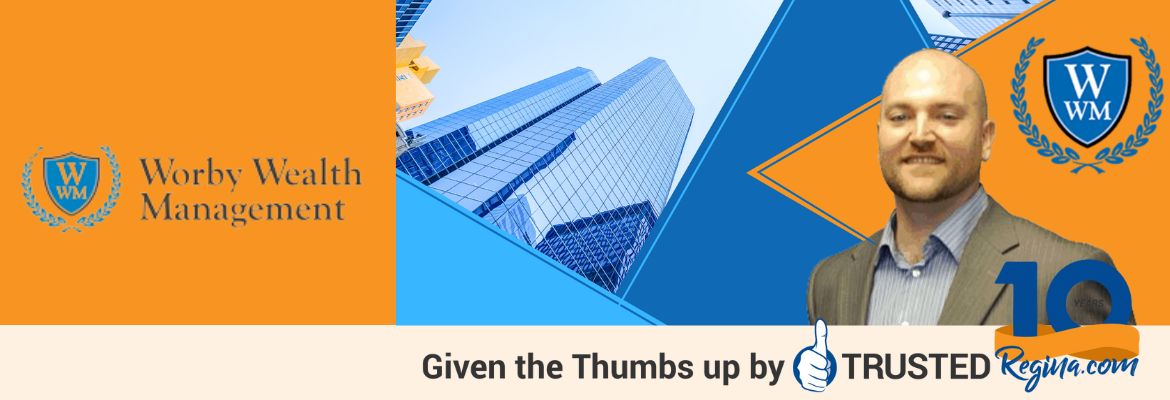Chris Worby is a Trusted Regina based financial advisor and Wealth Management services provider. With over 20 years of experience, Worby Wealth Management has been committed to providing a high standard of financial service to individuals, families and business owners in Regina and area. Worby Wealth Management listens and provides a personalized financial plan. In their latest Worby Wealth Management Trusted Regina Financial Tip, they share details about Registered Retirement Saving Plan (RRSPs).

Registered Retirement Saving Plans (RRSPs)
By Chris Worby - May 2023
A Registered
Retirement Savings Plan (RRSP) is an investment that is registered with the Canada Revenue Agency (CRA) which allows for the deferring of taxes owed on the money contributed and any investment income
earned until future years when the funds are withdrawn.
RRSP Contributions
The money you
contribute to an RRSP now allows you to reduce the income you pay tax on for
the previous taxation year. 2 months into the next calendar year is the usual
deadline to invest into RRSPs for the previous taxation year. That means January and February is the
perfect time to invest in an RRSP for the previous tax year.
“Wait, did you mean now as in now, or as in now…
eh I’ll get to it soon now?”
That old adage is
never more relevant –
" The best time to invest was 50 years ago… the
second best time to invest is right now! "
The 2022 limit is
$29,210 or 18% of your earned income reported on your 2021 tax return (whichever
is less), minus any employer-sponsored pension plan contribution, plus any
unused contribution room from previous years.
Check your most recent CRA Notice of Assessment (NOA) to determine
your limit.
Age Limits
No minimum contribution age exists, but you must
have earned income reported to CRA. At
Worby Wealth Management, we’ll never promote child labour; regardless, my
children seem to think spending time on Roblox counts as performing a household
chore.
The sooner you start contributing to your RRSP, the
better to take advantage of the power of compounding. Contributions can be
made until you turn 71, when they must be converted to an RRIF, or you must purchase an Annuity.
Investment Choices
Various
investments can be held in an RRSP, including cash, GICs, bonds, mutual funds,
ETFs and individual stocks. However,
before choosing your investment approach, it’s always best to consider Retirement, Tax,
and possibly even Estate issues.
Questions regarding RRSPs?
If you have
questions about account or investment options, contact Worby Wealth Management to get your
questions answered and start investing in an RRSP or other investment accounts
today.
Some of the services that Worby Wealth Management can help you with:
TRUSTED REGINA FINANCIAL ADVISOR Chris Worby from Worby Wealth Management helps you live your dream!

The
comments herein are a general discussion of certain issues intended
as general information only and should not be relied upon as tax or legal
advice. Please obtain independent professional advice in the context of your
particular circumstances. This Blog was
written, designed and produced by Chris Worby for the
benefit of Chris Worby, a Financial Advisor at Worby
Wealth Management, a registered trade name with Investia Financial Services
Inc., and does not necessarily reflect the opinion of Investia Financial
Services Inc. The information contained
in this article comes from sources we believe are reliable, but we cannot guarantee
its accuracy or reliability. The
opinions expressed are based on an analysis and interpretation dating from the publication date and are subject to change without notice. Furthermore, they do not constitute an offer
or solicitation to buy or sell securities.
Mutual Funds approved exempt market products and/or exchange-traded
funds are offered through Investia Financial Services Inc.
Chris Worby is a Trusted Regina based financial advisor and Wealth Management services provider. With over 20 years of experience, Worby Wealth Management has been committed to providing a high standard of financial service to individuals, families and business owners in Regina and area. Worby Wealth Management listens and provides a personalized financial plan. In their latest Worby Wealth Management Trusted Regina Financial Tip, they share details about inflation.

Inflation
By Jeremiah Worby - April 2023
Inflation is when you inflate your tires with air. Inflation is also an economic term that
refers to the increase in the price of goods over time. The latter will be the
focus of this article. This increase in
prices can be caused by a variety of factors, including supply and demand as
well as changes in interest rates or government policy. Inflation can make it difficult for people to
plan their finances effectively because they have less purchasing power with
each paycheck.
Break it down for me
Inflation is measured using the consumer price index
(CPI). CPI is a measure of the changes
in the cost of living for consumers, including food, housing, transportation,
healthcare and entertainment. The CPI measures price changes for all urban consumers
by calculating average expenditures for each category.
Supply and Demand
The main factors that cause inflation are supply and
demand.
Supply
and demand are how much of a good or service is available, and how much people
want to buy at any given time. In
economics, there is only so much money in circulation (the supply). People will spend their money on goods and
services, which creates an increased demand for those goods and services – and
therefore an increased price for them.
Hard to Predict
Will Tom Brady be inducted into the Hall of
Fame? Some things are easy to
predict. Inflation is not one of them as
it has a big impact on the economy. When
inflation rises, it's usually because the quantity of money has increased
faster than the goods and services available for purchase. In other words, there is more money available
than there are goods and services in circulation. As a result, companies may raise their prices
in order to maintain profit margins or simply keep up with rising costs
associated with production.
However, if companies raise their prices too much
without enough corresponding demand for their goods and services – or not
enough supply of them – then inflation will decrease as people will buy less
from those companies or stop buying altogether for fear that prices will
continue to increase over time. The
result is often called “stagflation” (a combination of "stagnant"
economic growth coupled with inflation).
Inflation
can also cause decreases in employment or increases in commodity costs such as
food or fuel. This can lead consumers'
purchasing power down while putting pressure on businesses' profits by reducing
demand for products thus increasing unemployment across sectors. For example: If consumers spend less time
driving to go shopping due to rising gas prices, then fewer products will be sold
at grocery stores or department stores which would decrease profits.
Conclusion
Inflation is a
complex topic, and this article only scratches the surface (it will not scratch
that impossible to reach spot on your back).
It’s important to understand how inflation impacts your personal finances,
but it also affects businesses and governments as well. Inflation can be hard to predict and can have
a big impact on the economy. The two
main factors behind inflation are supply and demand. Inflation is generally caused by an economy
growing too quickly and demand for goods outstripping supply.
Questions regarding
inflation?
If you have
questions about inflation or what you can do to fight against it, then contact Worby Wealth Management to get your
questions answered and start investing today.
Some of the services that Worby Wealth Management can help you with:
TRUSTED REGINA FINANCIAL ADVISORs Chris & Jeremiah Worby from Worby Wealth Management help you live your dream!

The
comments contained herein are a general discussion of certain issues intended
as general information only and should not be relied upon as tax or legal
advice. Please obtain independent professional advice, in the context of your
particular circumstances. This Blog was
written, designed and produced by Jeremiah Worby and Chris Worby for the
benefit of Jeremiah Worby and Chris Worby who are Financial Advisors at Worby
Wealth Management, a registered trade name with Investia Financial Services
Inc., and does not necessarily reflect the opinion of Investia Financial
Services Inc. The information contained
in this article comes from sources we believe reliable, but we cannot guarantee
its accuracy or reliability. The
opinions expressed are based on an analysis and interpretation dating from the
date of publication and are subject to change without notice. Furthermore, they do not constitute an offer
or solicitation to buy or sell any securities.
Mutual Funds, approved exempt market products and/or exchange traded
funds are offered through Investia Financial Services Inc.
Chris Worby and Jeremiah Worby are Trusted Regina based financial advisors and Wealth Management services providers. With over 20 years of experience, Worby Wealth Management has been committed to providing a high standard of financial service to individuals, families and business owners in Regina and area. Worby Wealth Management listens and provides a personalized financial plan. In their latest Worby Wealth Management Trusted Regina Financial Tip, they discuss corporate estate planning.

The Wealth Building Toolkit: Corporate Estate Planning
So you’ve used your corporation to build
wealth and to provide a nice, stable income. At the end of it all, we all go
the way we do and it’s time to consider the two inevitabilities in life: death
and taxes.
Upon the death of a shareholder, there is what
we call a ‘deemed disposition’ of shares. This means that on the date of death,
shareholders are considered to have sold their shares at whatever gain or loss
they would incur at that time. Those shares are passed down to a new
shareholder in accordance with a will or some corporate documents dictating who
becomes the new shareholder. But regardless of what happens after, that
shareholder has sold their shares on that date.
This can represent some problems. Let’s say
no planning was done and the accounting was sloppy. If the shares were worth,
say, $1,000,000 at the time of passing but had little to no cost base, that would
be a $1M capital gain adding $500,000 to the income line of a taxpayer’s final
tax return and a $208,000 best-case scenario tax bill.*
If the inheriting shareholder didn’t have
the means to pay the tax bill and there were no other estate assets, they may
have to take a dividend to pay the bill meaning they’d have to declare a
$310,000 dividend to pay the tax for the dividend as well as to pay the tax for
the estate - again, there are better ways to do this but it’s the least tax
efficient way to manage the tax bill.
One of the ways to manage the tax bill is
to own life insurance in the corporation yet again. There is a notional account
called a ‘Capital Dividend Account’ that certain corporate activities create -
one of which is a life insurance payout less the ACB of the policy. This
‘CDA’ allows for dividends to flow through to shareholders without attracting
taxation.
In our example above, if there was an
insurance policy in the corporation which is triggered on death which is also
when our deemed disposition occurs, there would be money made available to be
removed from the corporation with no taxation. This could be used to pay the tax bill and
provide tax-free money to remaining shareholders.
These past 3 blogs
have shown the corporation as a wonderful tool for both reducing taxes while
accumulating wealth, streamlining income for retirement purposes and then how
to reduce tax burdens on death. It’s good when we can have all the tools in
working condition!
*all personal tax calculations are
estimates based on taxtips.ca tax calculator.
If you have
questions about wealth building, contact Worby Wealth Management to get your
questions answered and start investing in an RRSP, TFSA or other investment
accounts today.
Some of the services that Worby Wealth Management can help you with:
TRUSTED REGINA FINANCIAL ADVISORs Chris & Jeremiah Worby from Worby Wealth Management help you live your dream!

The
comments contained herein are a general discussion of certain issues intended
as general information only and should not be relied upon as tax or legal
advice. Please obtain independent professional advice, in the context of your
particular circumstances. This Blog was
written, designed and produced by Jeremiah Worby and Chris Worby for the
benefit of Jeremiah Worby and Chris Worby who are Financial Advisors at Worby
Wealth Management, a registered trade name with Investia Financial Services
Inc., and does not necessarily reflect the opinion of Investia Financial
Services Inc. The information contained
in this article comes from sources we believe reliable, but we cannot guarantee
its accuracy or reliability. The
opinions expressed are based on an analysis and interpretation dating from the
date of publication and are subject to change without notice. Furthermore, they do not constitute an offer
or solicitation to buy or sell any securities.
Mutual Funds, approved exempt market products and/or exchange traded
funds are offered through Investia Financial Services Inc.
Chris Worby and Jeremiah Worby are Trusted Regina based financial advisors and Wealth Management services providers. With over 20 years of experience, Worby Wealth Management has been committed to providing a high standard of financial service to individuals, families and business owners in Regina and area. Worby Wealth Management listens and provides a personalized financial plan. In their latest Worby Wealth Management Trusted Regina Financial Tip, they discuss corporate income.

The Wealth Building Toolkit: Corporate Income
Here you are, ready to retire, and you’re
getting all your ducks in a row: assessing your RRSP to RRIF options, seeing
how you can maintain OAS through the household, and you have spent your career
building wealth in a corporation so that’s a major tool in your kit.
The first and most interesting thing is
that, by definition, assets built in your corporate investment account are
going to be retained earnings which means you’ll be paying yourself dividends.
The upside of dividends is that you also get a dividend tax credit.
The benefit of dividends is this: let’s say
you were targeting this $95,000/yr of net income. From my last blog, we know
you’d need to take approximately $130,000 of gross income to provide that net
of taxes. A non-eligible dividend to make the same $95,000 net income needs to
only be $120,000 - dividends allow for more tax-advantaged income for sure and
the saving of $10,000 in this case.*
Another option is to use a life insurance
policy. If a corporation were to own a policy with the shareholder as life
insured, there could be a cash value built up in the policy against which a
loan could be set up to be settled upon the passing of the shareholder. As the
insurance policy is not required to declare gains for tax purposes year over year,
this tax deferral can lead to larger amounts within the policy and more money
available for a loan.
You’ve noticed I keep referencing ‘tools’
throughout this series. That’s because you can’t screw a screw with a hammer, and
you can’t drive a nail with a saw. I mean, I suppose you could do those things
but let’s attempt a little efficiency here! I think of retirement planning as
exactly this, pulling out the right tool for the job. And in this example of
having a high level of corporate assets, insurance is a great tool to help
build that wealth to do the job of providing security of income in retirement.
In the next blog, we’re going to talk about
insurance in corporations again but from more of an estate planning perspective
- no surprise but insurance is very helpful in dealing with taxes in an
estate.
*all personal tax calculations are
estimates based on taxtips.ca tax calculator.
If you have
questions about wealth building, contact Worby Wealth Management to get your
questions answered and start investing in an RRSP, TFSA or other investment
accounts today.
Some of the services that Worby Wealth Management can help you with:
TRUSTED REGINA FINANCIAL ADVISORs Chris & Jeremiah Worby from Worby Wealth Management help you live your dream!

The
comments contained herein are a general discussion of certain issues intended
as general information only and should not be relied upon as tax or legal
advice. Please obtain independent professional advice, in the context of your
particular circumstances. This Blog was
written, designed and produced by Jeremiah Worby and Chris Worby for the
benefit of Jeremiah Worby and Chris Worby who are Financial Advisors at Worby
Wealth Management, a registered trade name with Investia Financial Services
Inc., and does not necessarily reflect the opinion of Investia Financial
Services Inc. The information contained
in this article comes from sources we believe reliable, but we cannot guarantee
its accuracy or reliability. The
opinions expressed are based on an analysis and interpretation dating from the
date of publication and are subject to change without notice. Furthermore, they do not constitute an offer
or solicitation to buy or sell any securities.
Mutual Funds, approved exempt market products and/or exchange traded
funds are offered through Investia Financial Services Inc.
It is said that in this world, nothing is certain but death and taxes. Modern estate planning aims to assist individuals to navigate both of these unpleasant certainties. Preparing double wills is an estate planning technique which minimizes the number of probate fees (estate administration taxes) payable on death by your estate.
Primary and Secondary wills
Double Wills – Primary (Public Asset Will) and Secondary (Private Asset Will)
Depending on the nature of a person’s assets, it is often beneficial to have a “primary” Will to deal with real property and assets held in financial institutions (public assets) and a “secondary” Will to deal with assets held in a private corporation, personal effects, vehicles, the proceeds of life insurance policies payable to the estate and any other asset which does not require probate to pass to a beneficiary (private assets).
Probate is required in select circumstances, and when it is required for the estate trustee to effectively deal with one asset in a will then all assets governed by that will must be probated. In that event, the estate will be required to pay the estate administration tax on the combined value of all assets governed by the will. Savvy individuals can avoid this problem through the use of multiple wills and proper drafting.
The use of multiple wills received judicial approval in Ontario in Granovsky Estate v. Ontario, 1998 CanLII 14913 (ON SC). Therein the court considered the testator’s use of two wills: a ‘Primary Will’ and a ‘Secondary Will’. The Secondary Will exclusively governed the testator’s private company shares, amounts owing to the testator from said companies, and assets held in trust for the testator by said companies. In other words, the secondary estate consisted solely of those assets that the estate trustee could deal without needing probate. Whereas the Primary Will governed all of the testator’s other assets, for which probate was required. The court in Granovsky found that there was no prohibition in the applicable legislation which could prevent a testator from having both a primary and secondary will – a testator may plan his or her estate as she or he sees fit. Notably, the court held that there was no requirement to submit the Secondary Will to probate or pay the estate administration tax on the value of the assets governed by the Secondary Will.
Following Granovsky, Ontario has witnessed a marked increase in the popularity of multiple wills as a method for effective estate planning. Complimentary to the reduced tax liability are the added benefits of ease of administration of one’s estate and privacy, as a probated will is a public document. These combined benefits make preparing multiple wills a prudent investment for the common sense business owner.
For advice, Robert MacKay's team provides professional, personalized service and with their assistance, you can rest assured that your real estate transactions will be handled with the utmost consideration and care.
They provide a full range of legal services including:
- Real Estate & Mortgages
- Wills & Estates
- Family Law & Divorce
- Commercial & Corporate Law
- Litigation & Personal Injury
ROBERT Mackay is your TRUSTED REGINA LAWYERS!